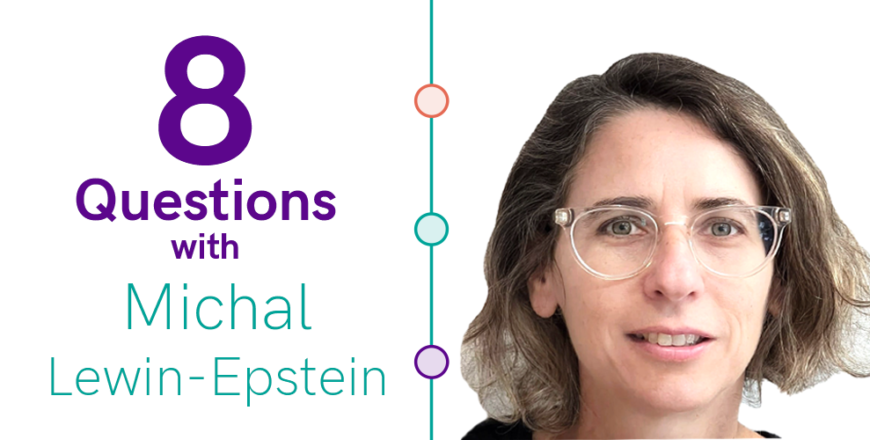
8 Questions with Michal Lewin-Epstein
In “8 Questions With…,” we share a brief Q&A with a staff member. In this edition, we hear from Michal Lewin-Epstein, who joined Rosov Consulting as a Senior Project Associate in 2022, with experience in education and environmental sustainability practices.
1. What’s your area(s) of expertise and how has it been beneficial and led to success in your work?
My background is in mixed-method evaluation research, with most of my experience in education and some in environmental sustainability practices. Having diverse and international experience has no doubt helped me to develop a growth-oriented and open-minded approach. I also gained the ability to adapt and think out of the box to view challenges with creativity and imagination.
2. What experiences have led you into your current career path?
My career path started at the Henrietta Szold Institute in Jerusalem, a research institute for education and social sciences. I was trained as a mixed-method evaluator working on evaluations of nationwide educational programs. My two mentors, Prof. Isaac Friedman (the then-head of the institute) and Dr. Raya Brama, shaped my career by setting high expectations, modeling rigorous research, and empowering me to take on in-depth research responsibilities.
My life journey took me from Jerusalem to The Hague, and from there to New York City. In Brooklyn (where I now reside), I continued conducting evaluation studies, including as a freelancer for a number of Jewish organizations and at the New York City’s Department of Education.
As an active parent in our synagogue, I am increasingly curious and passionate about the changes in the Jewish world and how people reinvent it to adapt to trends of this era. Joining Rosov Consulting allowed me to further explore themes that are at the forefront of the Jewish world.
3. What do you like learning about most through your work?
At Rosov, I am on the front lines of important issues and challenges facing Jewish communities today. I get to be a part of helping organizations that engage in myriad areas and issues, such as innovative Jewish educational programs; teens’ social-emotional wellbeing; accessibility of Jewish life (ranging from financial affordability to LGBTQ+ diversity); Jewish Ukrainian and Russian refugees/immigrants; and incorporating climate and sustainability measures into our lives.
I love learning about the diversity of the Jewish world, its beauty, and its challenges, intertwined. Our work on cutting-edge initiatives in these spaces is always interesting, and I truly feel that we are making an impact.
4. What do you like most about working at Rosov Consulting?
One of the best things about Rosov Consulting is the work environment. Our team is comprised of talented, intelligent, and thoughtful people who deeply care about the quality of the work and each other’s wellbeing.
I love the different types of projects, whether we’re studying Jewish day schools, youth organizations, or programs and initiatives created by foundations or government agencies. Our clients are deeply committed to their work and to improving Jewish communities. That is truly inspiring.
5. What are some challenges of your work?
One challenge that I enjoy is creating a survey that accurately and effectively captures the issues that are at stake. Curating a survey is an art and a science. It requires both clear and concise word choices to maximize validity, as well as a strong understanding of the broader goals, the specific objectives, and the audience of the survey, all to optimize the survey’s reliability.
Once the survey design is complete, the biggest challenge—and what often requires the most effort—is to reach our expected response rates. This is something that we, as an organization, put a lot of thought into. We strive to reach as many voices as possible and obtain a wide range of opinions in order to best represent all constituencies and stakeholders.
6. What have been the biggest changes in the field and/or your work specifically since you started?
While I only recently started at Rosov, I am struck by the current focus on teens’ wellbeing and Jewish communities’ renewed commitment to best support their teens. As a mom of a tween and teen, I am so pleased to see that there are growing conversations around these issues and burgeoning initiatives to address perhaps one of the biggest challenges we’re facing today.
7. How do you think your job and/or the field might change in the next 10 years?
The Jewish world is increasingly broad, spanning diverse communities of economic, ethnic, and gender diversity. I believe the field will expand the conversations that are already happening, as well as initiatives that aim to embrace the diversity of Jewish families. These efforts will help ensure that Jews of color feel welcomed and that programming is accessible and affordable to all.
In addition, I think that the Jewish engagement and education fields, and Jewish communities, will be thinking more about their roles in weaving sustainability into Jewish life as a response to the climate crisis and in order to create a more sustainable and equitable world for all.
8. What do you think is essential reading to excel in your field?
Books by Michael Quinn Patton, the former president of the American Evaluation Association, are quite fundamental to our work. His book Utilization-Focused Evaluation provides an overall framework for designing and conducting evaluations that enhance their utilization. Keeping up with current events is also essential. Central to our work are articles from eJewish Philanthropy, Forward, and publications or newsletters from our clients.




